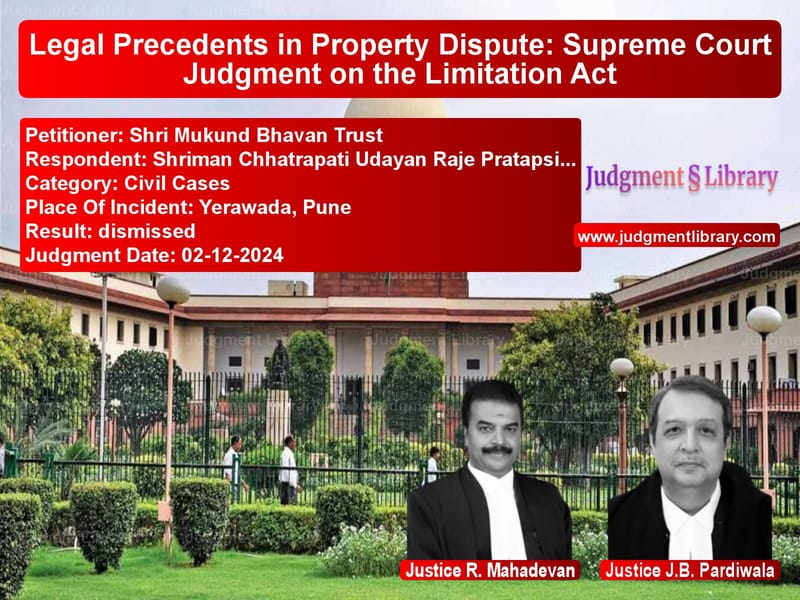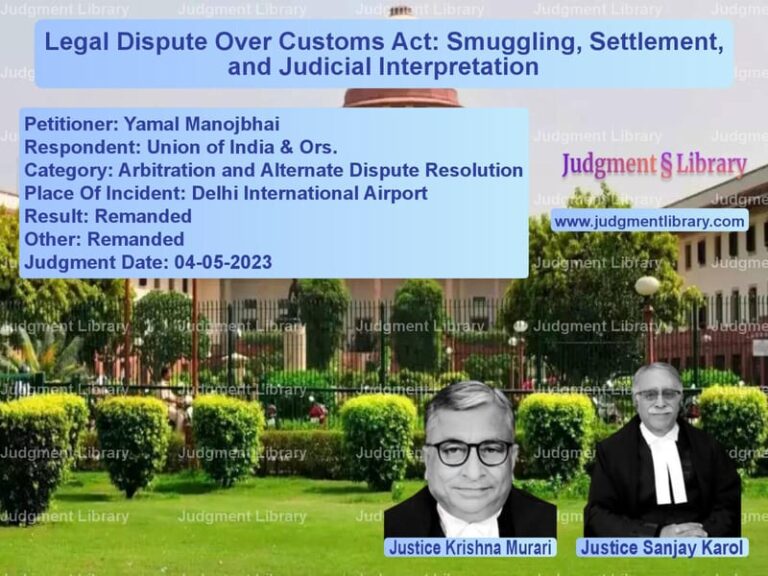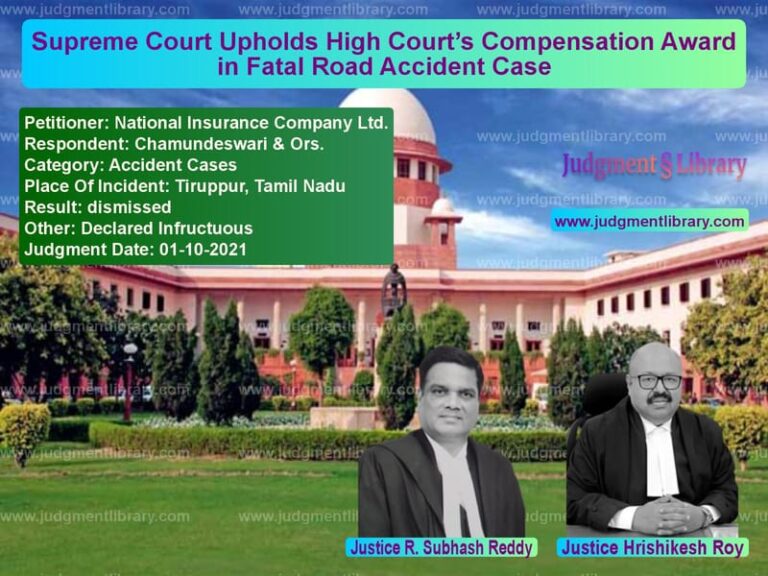Legal Precedents in Property Dispute: Supreme Court Judgment on the Limitation Act
The case of Shri Mukund Bhavan Trust and Ors. vs. Shriman Chhatrapati Udayan Raje Pratapsinh Maharaj Bhonsle revolves around a property dispute over land in Yerawada, Pune. The main issue centers on the applicability of limitation laws and the rejection of the plaint under Order VII Rule 11 of the Civil Procedure Code (CPC). The petitioner, Shri Mukund Bhavan Trust, sought to reject the plaint filed by the respondent claiming ownership of the suit lands. The judgment addresses the legal principles concerning limitation, fraudulent claims, and the enforcement of property rights.
Background of the Case
In 2009, the respondent, Shriman Chhatrapati Udayan Raje Pratapsinh Maharaj Bhonsle, filed Special Civil Suit No. 133 of 2009 against the appellants, the Shri Mukund Bhavan Trust, and the State of Maharashtra, seeking various reliefs related to the ownership and possession of the suit lands in Yerawada. The suit sought to declare the respondent as the absolute owner, to restrain the appellants from dealing with the lands, and to set aside several compromise decrees involving the suit lands.
The appellants contested the suit by filing an application under Order VII Rule 11 of CPC, arguing that the suit was barred by limitation, as the reliefs sought by the respondent were based on stale claims. The trial court rejected the application, and the appellants subsequently filed a revision application before the High Court, which was also dismissed. The appellants, dissatisfied with the High Court’s decision, filed an appeal in the Supreme Court.
Arguments of the Petitioner
The petitioner’s counsel argued the following points:
- The respondent’s claims were barred by limitation under the Limitation Act, as the suit was filed much after the prescribed period for challenging the sale deeds executed in 1938 and 1952.
- The respondent attempted to create a false cause of action by relying on a fictional date of knowledge in 2007, when the actual cause of action arose much earlier.
- The trial court erred in rejecting the application under Order VII Rule 11 of CPC by not recognizing the applicability of the limitation period to the suit.
- The respondent’s claim to ownership of the lands was based on fraudulent misrepresentation and lacked legal foundation, as the sale deeds and compromise decrees were legally valid and had been in effect for decades.
Arguments of the Respondent
The respondent’s counsel countered the petitioner’s arguments by asserting:
- The respondent’s ancestors were rightful owners of the land, and the sale transactions conducted by the appellants were fraudulent, as they had no authority to alienate the land.
- The respondent only became aware of the fraudulent nature of the proceedings in 2007, when he received information about the misrepresentation made in previous suits.
- The question of limitation should not be decided at this stage, as it is a mixed question of law and facts that requires the presentation of evidence in the trial.
- The respondent had the right to seek a declaration of ownership and possession over the land, as the compromise decrees were void and the respondent had not been a party to them.
Supreme Court’s Analysis
The Supreme Court analyzed the issue of limitation and the claims made by the parties. The Court noted that:
- Under the Limitation Act, the right to sue accrues when the plaintiff becomes aware of the facts that entitle them to relief. The Court considered whether the respondent’s claims were based on a fresh cause of action or an attempt to revive stale claims.
- The Court observed that the respondent’s claims were based on a misrepresentation of facts, and the attempt to circumvent the limitations period by claiming knowledge in 2007 was unfounded.
- The Court emphasized that the issue of limitation should be considered at the earliest stage, as a suit filed after the expiration of the limitation period wastes judicial time and resources.
- The Court concluded that the respondent’s suit was barred by limitation, as it was filed long after the sale transactions and compromise decrees, and the plaint failed to disclose any valid cause of action.
Judgment
The Supreme Court allowed the appeal and set aside the decisions of the lower courts. The Court held:
- The plaint filed by the respondent was liable to be rejected under Order VII Rule 11 of CPC, as the claims made were clearly barred by limitation.
- The Court ruled that the respondent’s attempt to create a cause of action in 2007 was an artificial construct, and the real cause of action had long since expired.
- The Court also emphasized the importance of not allowing fraudulent claims to protract litigation and stated that the power under Order VII Rule 11 of CPC should be used to prevent vexatious suits from proceeding to trial.
The judgment serves as an important precedent in property disputes, particularly regarding the application of limitation laws and the dismissal of suits at an early stage when the claims are legally untenable.
Petitioner Name: Shri Mukund Bhavan Trust.Respondent Name: Shriman Chhatrapati Udayan Raje Pratapsinh Maharaj Bhonsle.Judgment By: Justice R. Mahadevan, Justice J.B. Pardiwala.Place Of Incident: Yerawada, Pune.Judgment Date: 02-12-2024.
Don’t miss out on the full details! Download the complete judgment in PDF format below and gain valuable insights instantly!
Download Judgment: shri-mukund-bhavan-t-vs-shriman-chhatrapati-supreme-court-of-india-judgment-dated-02-12-2024.pdf
Directly Download Judgment: Directly download this Judgment
See all petitions in Contract Disputes
See all petitions in Property Disputes
See all petitions in Damages and Compensation
See all petitions in Judgment by R. Mahadevan
See all petitions in Judgment by J.B. Pardiwala
See all petitions in dismissed
See all petitions in supreme court of India judgments December 2024
See all petitions in 2024 judgments
See all posts in Civil Cases Category
See all allowed petitions in Civil Cases Category
See all Dismissed petitions in Civil Cases Category
See all partially allowed petitions in Civil Cases Category







